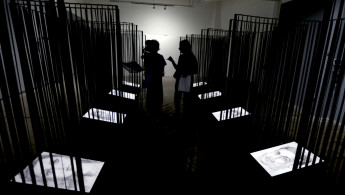Four years, four words: Remembering the abducted Syrian activist group Douma4
The four human rights activists were kidnapped by armed men on December 9, 2013 in Eastern Ghouta during a raid on the Violations Documentations Centre where they worked on recording human rights violations.
A campaign entitled Four Years, Four Words was launched by Amnesty International on Friday calling on the brutal regime of Syrian President Bashar al-Assad to disclose the whereabouts of the activists.
"The abduction and disappearance of the Douma4 is a grim reminder of what it costs to expose truth and injustice in Syria," said Samah Hadid, Middle East Campaigns Director at Amnesty International.
"These human rights defenders are a symbol of courage and resilience, their voices will never be silenced."
The rights group is calling on the Syrian government and on armed opposition groups in Eastern Ghouta to immediately take steps to disclose the whereabouts and fate of the Douma4 and to help secure their release, adding that "their families have waited too long."
As part of their campaign, Amnesty is also asking people to sign a petition Tens of Thousands, calling on Assad’s government and armed opposition groups to immediately reveal the fate of more than 75,000 people who have been forcibly disappeared since the war broke out in 2011.
Twitter Post
|
Even before the crisis began in 2011, Syrian authorities followed a policy of forcibly disappearing people for peaceful political opposition, critical reporting, and human rights activism. The use of enforced disappearances dramatically escalated since the uprising.
According to the Syrian Network for Human Rights (SNHR), 75,000 people have been subjected to enforced disappearance by the Syrian regime since 2011.
Meanwhile more than 2,000 individuals have gone missing at the hands of armed opposition groups and the so-called Islamic State.
 |
The abduction and disappearance of the Douma4 is a grim reminder of what it costs to expose truth and injustice in Syria |  |
Family grief
Families in Syria continue living in hope and agony, waiting to hear news on their loved ones.
In a heart-breaking letter, Yassin Al Haj Saleh pens his thoughts to his wife, Samira Khalil, missing for over four years.
"I cannot convince myself that 'it was meant to be' for you to disappear for years... four years now, close to the four that you had already spent in the Syrian regime’s prison.
"Why did you have to disappear?" he questions.
For years families have appealed to the Syrian regime and armed groups for information, none of which are forthcoming.
Both the Syrian regime and armed groups deny any accusations. Leen Hashem, Amnesty’s Syria campaigner explains how the lack of impunity allows war crimes and crimes against humanity to continue in Syria.
"Russia continually blocks proceedings in the ICC with its veto" she added.
'Tens of Thousands'
In August, Amnesty International launched the Tens of Thousands art exhibition in Beirut to mark the International Day of the Disappeared. The exhibition aimed to raise awareness of Syria's disappeared and missing and give a voice to their families.
The exhibition at the Station Beirut gallery features items left behind by individuals who have been forcibly disappeared or abducted, as well as poems written by formerly detained poets describing their experiences in Syrian detention facilities.
 |
For years families have appealed to the Syrian regime and armed groups for information, none of which are forthcoming |  |
There is also a collection of portraits of women detainees by Syrian artist Azza Abou Rebieh.
The rights group also launched an online campaigning platform to shine a light on those who have faced enforced disappearance and abduction in Syria and help families in their efforts to find their loved ones.
The Syrian conflict began when the Baath regime, in power since 1963 and led by Assad, responded with military force to peaceful protests demanding democratic reforms during the Arab Spring wave of uprisings, triggering an armed rebellion fuelled by mass defections from the Syrian army.
According to independent monitors, hundreds of thousands of civilians have been killed in the war, mostly by the regime and its powerful allies, and millions have been displaced both inside and outside of Syria.
The brutal tactics pursued mainly by the regime, which have included the use of chemical weapons, sieges, mass executions and torture against civilians have led to war crimes investigations.





 Follow the Middle East's top stories in English at The New Arab on Google News
Follow the Middle East's top stories in English at The New Arab on Google News


